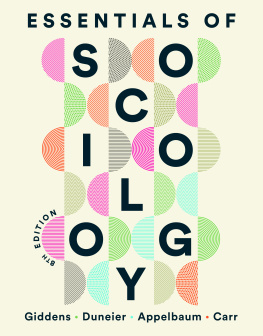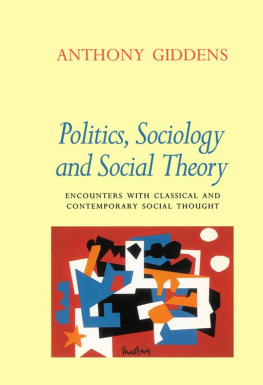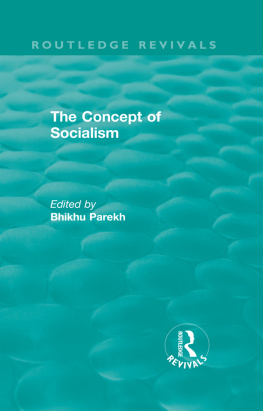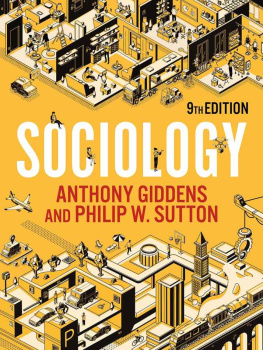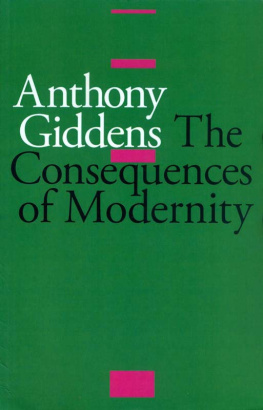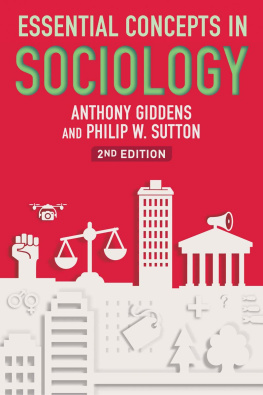
Anthony Giddens
This book provides an introduction to the work of Anthony Giddens, and a critical discussion of his ideas. It sets out the background to and sources for Giddenss development of structuration theory and describes the main features of this theory. The author also discusses the substantive contributions that Giddens has made to the theory of social class and his historical sociology, including his conception of modernity.
The book is intended to provide an accessible introduction to Giddenss work and also to situate structuration theory in the context of other approaches. It is argued that while Giddens has made some important contributions to social theory, structuration theory is not the transcendent grand theory that it is sometimes claimed to be. It does not replace other approaches nor does it incorporate some of the more important insights of modern philosophy and psychotherapy.
It is the only book (so far) to deal with Giddenss work as a whole which avoids the vexing extremes of hagiography and facile criticism. Judicious, crisply argued and highly readable, the book will be of interest to students of Sociology and those working in the other Social Sciences.
Ian Craib lectures in Sociology at the University of Essex and works as a group psychotherapist.
Anthony Giddens
Ian Craib
London and New York
First published in 1992
by Routledge
11 New Fetter Lane, London EC4P 4EE
This edition published in the Taylor & Francis e-Library, 2011.
To purchase your own copy of this or any of Taylor & Francis or Routledges collection of thousands of eBooks please go to eBookstore.tandf.co.uk.
Simultaneously published in the USA and Canada
by Routledge
a division of Routledge, Chapman and Hall Inc.
29 West 35th Street, New York, NY 10001
1992 Ian Craib
All rights reserved. No part of this book may be reprinted or reproduced or utilized in any form or by any electronic, mechanical, or other means, now known or hereafter invented, including photocopying and recording, or in any information storage or retrieval system, without permission in writing from the publishers.
British Library Cataloguing in Publication Data
Craib, Ian 1945
Anthony Giddens.
1. Sociology
I. Title
301.092
Library of Congress Cataloging in Publication Data
Craib, Ian 1945
Anthony Giddens/Ian Craib.
p. cm.
Includes bibliographical references and index.
1. Giddens, Anthony. 2. Sociology-Methodology. 3. Social structure. 4. Sociology-Great Britain. I. Title
HM22.G8G5434 1991
301.01dc20
9112147
CIP
ISBN 0-203-82953-0 Master e-book ISBN
ISBN 0-415-07072-4 (hbk)
ISBN 0-415-02814-0 (pbk)
For Fiona, Ben, Chris, Penelope and Theo: without whom this book would have been finished six months earlier, and the authors life impoverished beyond imagination.
Preface
I have found this a very difficult book to write. I do not think in the same way as Anthony Giddens, and have had to spend much time thinking against myself. I hope the result is at least fair to its subject.
I suspect that more people than I would like to acknowledge have had to tolerate me whilst I have been writing; those I would like to acknowledge include David Lee, of the Sociology Department at Essex, who read and discussed a long and remarkably tedious first draft; Professor Christopher Bryant, of Salford, for some generous comments on the same draft, and Rob Stones, also of the Sociology Department at Essex, for reading a later draft, arguing with me, and making me think.
Chapter 1
Out of chaos?
THE GIDDENS PROJECT
Anthony Giddens is certainly a phenomenon amongst British sociologists : a major grand theorist. Increasingly, he has come to see himself as a social, rather than just a sociological theorist, concerned with ideas relevant across the range of social sciences and breaking down the barriers amongst the disciplines. The volume of secondary literature now appearingfour substantial books alone in the year around my writing these words1is a tribute to his importance in modern sociology. He is the main interpreter of modern social theory, and not only in the English-speaking world. This demands both an accessible account of his work and a critical discussion, and this book attempts both. This chapter will be concerned with an initial characterisation of his enterprise and an outline of the central threads of my critical discussion.
His project has unfolded in a consistent way since Capitalism and Modern Social Theory was published in 1971. What strikes me about this book now, looking at it from nearly twenty years on, is that it is possible to pick out two strands of Giddenss thought which interweave throughout his work: the nature of a general social theory on the one hand, and understanding the development of modern industrial society on the other. Marx, Weber and Durkheim were, he argues, primarily concerned with what distinguishes capitalism from other preceding forms of social organisation, and his comparison of the three emphasises the centrality to each of changing social relationships. It is misleading to treat them as if they were producing general, universally applicable theories of society: doing so has left sociology in a strait-jacket.
The central object of sociology should be modern society and the changes it is undergoing. Instead of taking each theorist as providing a theoretical paradigm, we need to subject them to criticism, keeping what is useful to this task and abandoning the rest. In particular, we should sort out what it was in their work which was a result of and a response to conditions that no longer exist. Social theory has to be radically restructured if we are to understand the modern world. Giddenss next important book, The Class Structure of the Advanced Societies in 1973, was concerned with modern social change, but from then through to the first volume of A Contemporary Critique of Historical Materialism in 1981, his work was almost entirely of a theoretical nature, and while much of his output remains theoretical, there has now been a return to understanding the nature of modern society and social change.
It is difficult to characterise his enterprise in any easy way. It is a radical revision of social theory and of sociology itself, which increasingly extends to the other social sciences, as he writes about history, geography and economics. It is a work of synthesis, bringing together insights from many different disciplines and thinkers; it is, I think, symptomatic that one of his most recent publications has been a text book, which carries implications of an established body of knowledge and research, a solid discipline, which up to now very few people have thought sociology to be. For the time being, however, I will concentrate on the radical reconstruction of social theory: that is the centre of his work.
Giddens has often catalogued the situation from which this project appeared. There was after the Second World War a period of twenty years or more when sociology was dominated by what he calls an orthodox consensus, when the dominant theoretical framework was Parsons structural-functionalism. During the late 1960s, this began to break down under the impact of external political events and there was a period, the effects of which are still very clearly with us, when sociology fragmented, searching through politics and philosophy in particular for the means to grasp what seemed a rapidly changing world. Giddens, whose main work began to appear well into this period, offers a way out of the chaos. In addition to the revision of the classic sociological thinkers, he offers a rewriting of the history of sociology, criticising what he often calls the myths of sociology: that social science can model itself on the natural sciences; that it has its origins in conservative thought; that sociology can be seen as a debate between consensus and conflict approaches and others.





